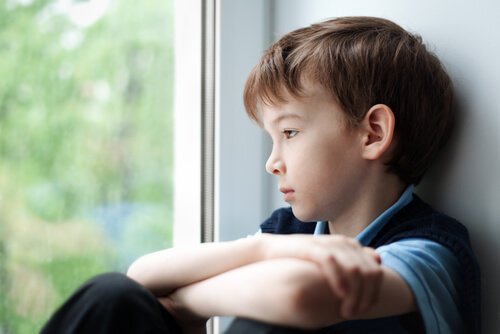The Health Effects of Bullying


Written and verified by the psychologist Valeria Sabater
Bullying negatively affects our health. This behavior that hurts, humiliates, and invalidates people doesn’t just lead to anxiety or stress. Anyone who’s been bullied can develop depression, chronic pain, digestive problems, or even insomnia. They can even suffer these effects in the long term.
People bully others in many damaging ways. It doesn’t just happen in schools, but also in our workplaces, in our relationships, between parents and children, and even between siblings. The consequences of bullying are so severe that experts believe it’s become a public health problem.
According to a University of Almería study, harassment and bullying-related suicide is the third leading cause of death among young people between the ages of 15 and 29. Those numbers continue to rise each year. Furthermore, another Suffolk University in Boston study warns that the majority of programs aimed at preventing bullying aren’t working.
Specialists in bullying and violent behavior note that the key element behind all of this is understanding what motivates a bully or anyone who intimidates or exercises power over others. We know that many people bully others to compensate for their own lack of self-esteem. Other bullies are the result of bad parenting. On the other hand, a very small number act out of malice.
There’s another essential aspect beyond this issue: the effect of bullying on the victims’ health and the need to act as soon as possible at both social and psychological levels.
“Three things in human life are important. The first is to be kind. The second is to be kind. And the third is to be kind.”
-Henry James-

What are the health effects of bullying?
The Center for Disease Control and Prevention (CDC) warns that the health effects of bullying are so severe that we need to implement prevention plans. In the most extreme cases, a bullied person can even resort to suicide.
There are other aspects that must be taken into account as well. First, suffering from this behavior for at least six months causes very obvious physical and psychological changes. What’s more, the traumatic effect of these experiences can last for years.
Forms of bullying
As we noted at the beginning, the range of aggressive behaviors can be very broad. Here are some examples:
- Verbal (insults, derogatory comments).
- Social (isolating another person).
- Physical (aggression).
- Psychological (manipulation, blackmail).
- Sexual (groping, physical humiliation, sexual abuse).
Psychological effects of intimidation
This behavior also has some effects that don’t leave an external mark. These effects weaken a person’s integrity and usually lead to poor physical health.
- Progressive loss of self-esteem.
- Stress and anxiety disorders.
- Loss of self-confidence.
- Distrust.
- Personal development issues.
- Loss of motivation.
- Decrease in the quality of social relationships.
- Psychological distress.
- Insecurity.
- Feelings of guilt and shame for not knowing how to manage these situations.
- Self-injury.
- Depression.
- Suicidal thoughts.
Physical effects of intimidation
David Hanscom is a specialist in chronic pain. His published works on the subject show us something important: suffering bullying for more than five months produces changes in a person’s health. The first noticeable change, for example, is a weakened immune system.
- Additionally, the Swedish Neuroscience Institute (SNS) pointed out that it’s common to suffer spinal problems. Back pain can eventually become chronic.
- Insomnia.
- Digestive problems can become chronic as well.
- Headaches and migraines.
- Weight loss.
- Skin problems.
- Hair loss.
As experts point out, emotions such as shame, anger, fear, and stress can end up altering our physiological processes.
What can we do to prevent bullying?
Now we know that bullying has many health effects. We also understand that some people, especially young people, respond dramatically to situations that they don’t know how to handle. This type of behavior haunts our classrooms, our workplaces, and even the intimacy of many of our homes.
What can we do about it? First of all, we need to educate ourselves. We have to be sensitive and establish preventive measures in each and every possible scenario: schools, universities, primary care centers, and workplaces.

Each person needs to know that professional help is available whenever they need it. In this regard, we need to provide access to psychologists who are capable of responding to someone who needs to stop reacting in order to begin acting.
We have to be more sensitive to those situations. We can’t fight bullying with good intentions or home remedies. Thus, we need concrete, intelligent, and effective actions.
Bullying negatively affects our health. This behavior that hurts, humiliates, and invalidates people doesn’t just lead to anxiety or stress. Anyone who’s been bullied can develop depression, chronic pain, digestive problems, or even insomnia. They can even suffer these effects in the long term.
People bully others in many damaging ways. It doesn’t just happen in schools, but also in our workplaces, in our relationships, between parents and children, and even between siblings. The consequences of bullying are so severe that experts believe it’s become a public health problem.
According to a University of Almería study, harassment and bullying-related suicide is the third leading cause of death among young people between the ages of 15 and 29. Those numbers continue to rise each year. Furthermore, another Suffolk University in Boston study warns that the majority of programs aimed at preventing bullying aren’t working.
Specialists in bullying and violent behavior note that the key element behind all of this is understanding what motivates a bully or anyone who intimidates or exercises power over others. We know that many people bully others to compensate for their own lack of self-esteem. Other bullies are the result of bad parenting. On the other hand, a very small number act out of malice.
There’s another essential aspect beyond this issue: the effect of bullying on the victims’ health and the need to act as soon as possible at both social and psychological levels.
“Three things in human life are important. The first is to be kind. The second is to be kind. And the third is to be kind.”
-Henry James-

What are the health effects of bullying?
The Center for Disease Control and Prevention (CDC) warns that the health effects of bullying are so severe that we need to implement prevention plans. In the most extreme cases, a bullied person can even resort to suicide.
There are other aspects that must be taken into account as well. First, suffering from this behavior for at least six months causes very obvious physical and psychological changes. What’s more, the traumatic effect of these experiences can last for years.
Forms of bullying
As we noted at the beginning, the range of aggressive behaviors can be very broad. Here are some examples:
- Verbal (insults, derogatory comments).
- Social (isolating another person).
- Physical (aggression).
- Psychological (manipulation, blackmail).
- Sexual (groping, physical humiliation, sexual abuse).
Psychological effects of intimidation
This behavior also has some effects that don’t leave an external mark. These effects weaken a person’s integrity and usually lead to poor physical health.
- Progressive loss of self-esteem.
- Stress and anxiety disorders.
- Loss of self-confidence.
- Distrust.
- Personal development issues.
- Loss of motivation.
- Decrease in the quality of social relationships.
- Psychological distress.
- Insecurity.
- Feelings of guilt and shame for not knowing how to manage these situations.
- Self-injury.
- Depression.
- Suicidal thoughts.
Physical effects of intimidation
David Hanscom is a specialist in chronic pain. His published works on the subject show us something important: suffering bullying for more than five months produces changes in a person’s health. The first noticeable change, for example, is a weakened immune system.
- Additionally, the Swedish Neuroscience Institute (SNS) pointed out that it’s common to suffer spinal problems. Back pain can eventually become chronic.
- Insomnia.
- Digestive problems can become chronic as well.
- Headaches and migraines.
- Weight loss.
- Skin problems.
- Hair loss.
As experts point out, emotions such as shame, anger, fear, and stress can end up altering our physiological processes.
What can we do to prevent bullying?
Now we know that bullying has many health effects. We also understand that some people, especially young people, respond dramatically to situations that they don’t know how to handle. This type of behavior haunts our classrooms, our workplaces, and even the intimacy of many of our homes.
What can we do about it? First of all, we need to educate ourselves. We have to be sensitive and establish preventive measures in each and every possible scenario: schools, universities, primary care centers, and workplaces.

Each person needs to know that professional help is available whenever they need it. In this regard, we need to provide access to psychologists who are capable of responding to someone who needs to stop reacting in order to begin acting.
We have to be more sensitive to those situations. We can’t fight bullying with good intentions or home remedies. Thus, we need concrete, intelligent, and effective actions.
All cited sources were thoroughly reviewed by our team to ensure their quality, reliability, currency, and validity. The bibliography of this article was considered reliable and of academic or scientific accuracy.
- Van Dijk, A., Poorthuis, A. M. G., & Malti, T. (2017). Psychological processes in young bullies versus bully-victims. Aggressive Behavior, 43(5), 430–439. https://doi.org/10.1002/ab.21701
- Organización Panamericana de la Salud. (2003). La intimidación sexual. In E. G. Krug, L. L. Dahlberg, J. A. Mercy, B. Zwi, Anthony, & R. Lozano (Eds.), Informe Mundial sobre la Violencia y la Salud (pp. 160–197). Washington, D.C.: Organización Mundial de la Salud. https://doi.org/10.1017/CBO9781107415324.004
This text is provided for informational purposes only and does not replace consultation with a professional. If in doubt, consult your specialist.







